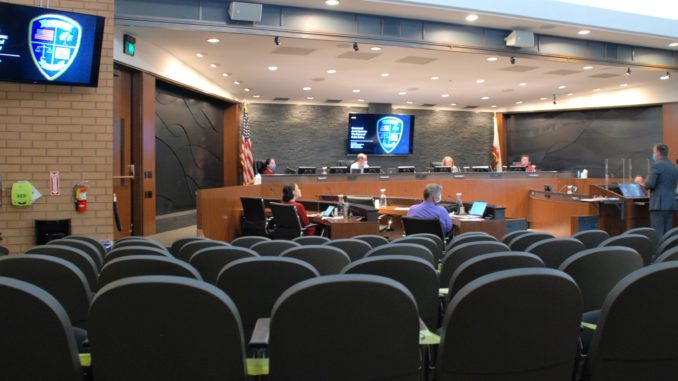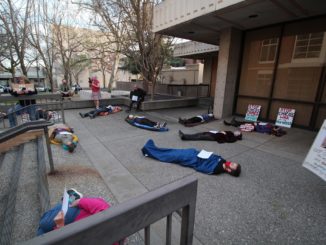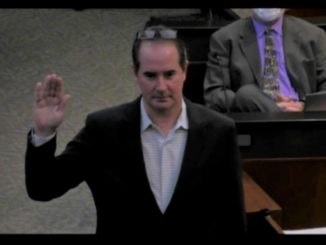
Form mirroring function, the Chico City Council decided in empty chambers—then behind closed doors—to act on homelessness without broad public input.
The council, which usually meets on Tuesdays, held a rare Monday meeting a week after maskless protesters refused to follow the city’s COVID-19 protocols during the April 20 session (the first meeting in months at which in-person speakers—one at a time—were to be allowed), then would not leave the room. Mayor Andrew Coolidge suspended the proceedings, which resumed last night (April 26) with public participation strictly via videoconferencing.
The packed agenda included a request by Councilman Scott Huber to agendize a discussion at the next meeting, May 4, if not sooner, about establishing a sanctioned campground for Chico’s homeless. He further asked that the city reconsider locations previously rejected and listed others for fresh consideration.
Councilman Sean Morgan asserted that the motion was unnecessary. The council soon would adjourn to closed session, where this topic would be discussed under the umbrella of the lawsuit filed against the city regarding its actions against homeless campers. On April 11, a federal judge issued a temporary restraining order preventing further enforcement of camping rules (see “Sweep relief”)—and extended it last Friday in a ruling that requires the city to submit a plan for court review in three weeks.
Huber replied that while he agreed the closed session would address his concern, he felt including the public in the process was vital. Councilmember Alex Brown, who seconded Huber’s motion, concurred.
The request failed 5-2, with Coolidge also citing Morgan’s reason. But the 90-minute closed session, which ended at 11:05 p.m., shone little light on the path ahead. City Clerk Debbie Presson announced that the council took no action but gave staff direction—and confidentiality of the closed session binds council members from public disclosure of those deliberations.
“Anyone understands that if you’re having discussions with an attorney about strategy, you need to have those discussions in a private way,” Coolidge told the CN&R just after Presson’s announcement. “I can’t predict what the council will do; I can say I’m optimistic the community will see us move towards some solutions, and I’m also optimistic that we’ll be continuing to gather input from the community on this subject as we move forward and head toward that May 14 [court] date.”
Huber is not wholly convinced.
“That’s the game that every city government plays: Let’s look like we’re transparent, but how can we avoid actually being [transparent]?” he said this morning (April 27) by phone. “And I think last night was evidence of that. The excuse given was that this was going to be talked about in closed session, but that didn’t address what my point was, which is that the community wants an opportunity to participate in this discussion. They want to hear opinions; they want to give opinions. …
“Regrettably, I think what happened last night was just an example of how leadership doesn’t really want to have open discussions with their communities—that if possible, they want to do whatever they can to make sure those discussions take place in a back room.”
Neither Coolidge nor Huber would say what the council decided regarding homelessness, but Huber confirmed the closed session included discussion of what he’d requested to be agendized, a sanctioned campground. Both said details should emerge over the next few days.
“I would like to be able to share as much as possible with the community,” said Huber, who consulted City Attorney Vincent Ewing—and plans to again—on how much he can disclose. “But at this point, suffice to say that progress was made on the questions that I posed regarding potential camp sites.
Nexus points
Monday night’s agenda had several significant items unrelated to homelessness and the lawsuit.
Police Chief Matt Madden gave a presentation on the department’s drone program, which when fully operational will serve as a high-tech, small-scale air unit. Madden stressed that only specially trained officers will operate drones, and the Federal Aviation Administration only will certify Chico Police Department as long as its policies adhere to privacy and due-process laws. The drones will not include facial recognition software, capture vehicle license plates nor get weaponized, Madden said.
The council also decided to start the process of considering bonds to pay off a sizable portion of the city’s $147 million unfunded pension liability to CalPERS. A 6-1 vote, with Councilwoman Kami Denlay dissenting, authorized an attorney firm specializing in bonds to file a court petition to permit the refinancing should the city choose this option.
Council members also unanimously validated City Manager Mark Orme’s hiring of former Butte County Deputy Administrative Officer Jennifer Macarthy as deputy city manager at a salary of $160,000 per year—and nodded approval to city staff’s plan to reopen council meetings to the public at 50 percent capacity starting in May.
Nonetheless, homelessness punctuated the night. Seven of the eight public speakers participating virtually in the open comment portion raised the issue, and beyond Huber’s request, Coolidge asked to agendize a presentation from the Butte Countywide Homeless Continuum of Care to explain that organization’s function.
The mayor cited a previous presentation from Butte County Behavioral Health, which he called enlightening for both members of the council and the public. The motion passed unanimously.
Afterward, Coolidge explained that Behavioral Health and the Continuum of Care fit into the bigger picture of homelessness in Chico. He acknowledged derision of the council majority’s actions—notably, sweeps of encampments—as a “game of whack-a-mole” (see “Editorial: Life and death consequences”). He responded that “there is no A-B-C-D answer to this problem, because if there is, every city would be following an A-B-C-D solution…
“You really have to take one aspect of it at a time,” Coolidge continued. “Not the opinion of the council, but my personal opinion is this issue needs to be approached on both sides: One needs to be enforcement and adherence to the law, and the other needs to be assistance to those who are willing and able to get it—also at the same time dealing with people in the state government who are not providing the mental health that they need to, the drug treatment that they need to, have turned our jails into turnstiles, things like that [which] are very hard to fight against.”
Due to the court order, the city must offer some sort of solution, to the satisfaction of the plaintiffs—eight homeless people represented by Legal Services of Northern California—and the judge. Huber told the CN&R that he doesn’t think the council’s conservative majority would have headed the way it’s going if not as a consequence of the litigation.
“I don’t want to cast such a cynical future of what’s going to happen,” he said. “There’s a chance over the coming weeks–before we get back to the judge–that the council decides on a direction that provides, to my way of thinking, a more humane setting. I would be delighted to find that that’s where we end up … that we’re providing something that people will actually use and will actually provide a short-term solution.
“I’m hopeful we don’t go the other direction and just provide the bare minimum that will end up being a failure, because we cannot afford another failure. We’ve had a series of failures with how we respond to the needs of both the unhoused people in the community and our housed community members.”




Thank you Evan for providing an overview of the Council meeting we were unable to follow. Let’s hope that Mayor Coolidge’s expressed desire for a more humane approach is representative of the Council majority.